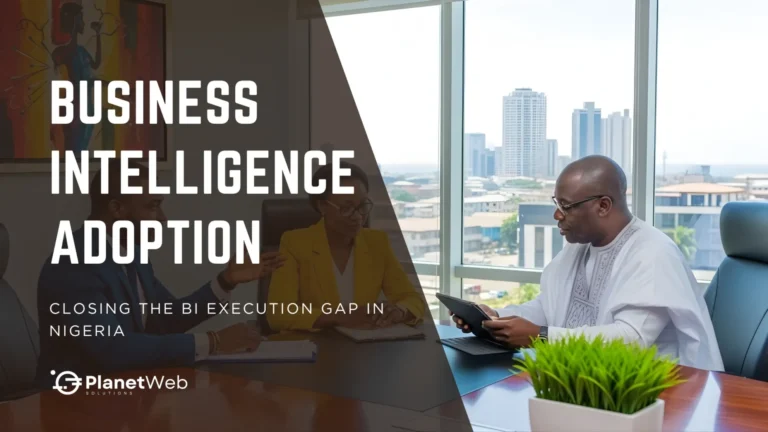The Harsh Truth About Consumer Startups in Nigeria
Nigeria’s 200 million people sounds like every consumer startup’s dream come true.
The pitch practically writes itself: “A massive untapped market, a growing middle class, and increasing smartphone adoption.” For years, these numbers have fueled founder optimism and attracted investor attention.
But dreams can be deceptive. A big market doesn’t automatically mean a wealthy one. Beneath the surface of Nigeria’s headline figures lies a tougher reality: most consumers have limited disposable income, infrastructure gaps drive up costs, and the unit economics rarely add up.
This is the uncomfortable truth that many founders discover too late: consumer startups in Nigeria face structural disadvantages, making them one of the riskiest models to choose.
This article continues our Startup Models to Avoid in Nigeria series, building on earlier discussions of flawed assumptions and fragile business models.
🌍 The Big Market Illusion
Founders often begin with the same belief: “If Nigeria has over 200 million people, the market opportunity must be huge.”
It’s an easy sell to investors. The “demographic dividend” story — massive population, rising smartphone adoption, and a supposedly growing middle class — sounds irresistible on a slide deck. But in practice, it’s a trap that has burned through founder time and investor capital. We’ve highlighted similar misconceptions in Why Startups Fail in Nigeria.
Here’s the reality: most of those 200 million people are price-sensitive, deal-driven, and have limited disposable income for anything beyond essentials. Even when demand exists, the infrastructure to serve it profitably often doesn’t. And when founders try to build those rails themselves — whether logistics, payments, or last-mile delivery — the costs quickly kill their unit economics.
The Economic Reality That Shapes Everything
Before we examine specific startup challenges, let’s understand the macroeconomic forces shaping Nigeria’s consumer market. These realities explain why the “200 million people” opportunity is more challenging than it appears and why it continues to squeeze consumer wallets.
Nigeria ranked 66th globally in the 2025 Startup Ecosystem Rankings. This reflects the structural challenges we’re about to explore.
Currency Volatility Kills Affordability
Naira fluctuations make products unaffordable overnight. Consumer budgets get eroded daily by inflation, leaving less money for discretionary purchases. Currency instability forces businesses to constantly adjust their pricing, making it nearly impossible to build predictable consumer purchasing patterns.
The Youth Population Myth
Nigeria’s young population sounds like an advantage until you look at employment and income data. High unemployment and underemployment rates mean most young people have limited disposable income. Essential spending on food, transportation, and housing consumes the majority of available funds.
Infrastructure Challenges Multiply Costs
Intermittent electricity and connectivity interruptions affect both user experience and operational costs. Poor addressing systems, traffic congestion, and poor roads increase delivery costs for every consumer transaction. When the infrastructure isn’t there, you either accept weak unit economics or spend scarce capital building rails yourself.
Now here’s how these macroeconomic realities create specific problems for consumer startups.
💰 The CAC Crisis That Kills Consumer Startups
Customer acquisition cost in Nigeria is particularly challenging for consumer companies.
You’re not just competing with other apps; you’re also fighting consumer indifference.
Marketing Spend Meets Purchasing Power Reality
Every marketing naira goes toward convincing price-conscious consumers to try something new. Conversion stays low because disposable income is limited. The customers you do acquire often churn fast when promotions end.
This challenge becomes even more severe when startups attempt category creation in Nigeria, where founders must not only educate customers about their specific solution but also convince them that an entirely new type of product category should exist.
And because Nigeria is a mobile-first market, slow or heavy apps silently tax acquisition; if a page takes more than a few seconds to load on a mid-range device, conversions drop.
The infrastructure challenges we discussed exacerbate this issue, as delivery costs effectively become part of your acquisition equation.
Heroshe: When Operational Reality Meets Consumer Economics
Take Heroshe, a Nigerian consumer e-commerce company that shut down in 2025. What started as order delays revealed deeper structural problems: the company moved its US warehouse operations from Texas to Delaware, but the transition created operational chaos.
Even worse, Heroshe couldn’t afford to clear packages that had already arrived in Nigeria. They asked customers to pay additional fees just to receive items they’d already purchased – a desperate move that destroyed customer trust. The delays weren’t just logistics hiccups; they were symptoms of a broken business model that couldn’t generate enough cash flow to fulfill basic operations.
Founder lesson: When you can’t afford to deliver products customers have already paid for, the unit economics have failed completely. High customer acquisition costs, operational complexity, and thin margins created a death spiral that no amount of funding could fix.
Meanwhile, B2B logistics companies, which serve businesses rather than individual consumers, continue to thrive and attract investment.
The Funding Shift Tells the Story
E-commerce funding decreased by 93% from $556 million in 2022 to $39.4 million in 2024. That collapse reflects a clear shift in investor confidence, forcing founders to manage their startup’s burn rate in Nigeria far more tightly.
But here’s where retention makes the problem even worse.
The Churn Challenge: Why Customers Don’t Stick
Even when you acquire customers, keeping them is nearly impossible. Here’s why the retention economics work against you.
Nigerian consumers download apps during promotions but uninstall them when the incentives stop. They cycle through apps looking for deals, not building loyalty to brands. Price-conscious users abandon apps quickly when better offers appear elsewhere.
The Lifetime Value Problem
Few customers make repeat purchases due to the economic realities we discussed earlier. Customer lifetime value stays low despite high acquisition costs.
Compare this to B2B models: once businesses adopt productivity tools, they rarely switch because the switching costs are high and the tools become essential to their operations.
In 2024, funding for the entire e-commerce sector plummeted to just $39.4 million, spread across 18 companies, a 66.7% decrease from 2023. The average round size dropped to $2.2 million as investors lost confidence in consumer models. These companies are competing for a shrinking pool of investor interest while serving customers with limited spending power.
B2B vs Consumer Reality: The Data Speaks Volumes
Let’s compare what’s actually happening with consumer vs B2B models in Nigeria. The contrast is striking.
Consumer Models Struggle Across the Board
- Heroshe’s shutdown: Even with funding, consumer e-commerce couldn’t survive operational realities.
- E-commerce sector decline: A 93% funding drop indicates that investor confidence has shifted dramatically.
- Jumia’s strategic pivot: Even Africa’s biggest consumer play couldn’t sustain a pure B2C model.
B2B Models Tell a Different Story Entirely
Moniepoint: The unicorn model
Moniepoint raised $110 million in 2024 and became a Nigerian fintech unicorn. They’re expanding internationally, even acquiring Sumac Microfinance Bank in Kenya. Their success comes from serving businesses, not individual consumers.
Active B2B acquisition spree
- C-One acquired Bankly to strengthen its fintech footprint
- BAS Group acquired Zuvy Technologies, targeting Nigeria’s $236 billion credit gap
- First Ally Capital acquired a majority stake in fintech Migo
Funding dominance confirms investor preference
B2B-focused fintech raised $638.8 million (45% of all African startup funding in H1 2025). While consumer e-commerce struggled with $39.4 million across 18 companies, single B2B fintech deals raised more than the entire consumer sector. This dominance reflects the strength of proven fintech business models in Nigeria.
Why B2B Models Succeed Where Consumer Fails
- Predictable revenue: Business contracts and recurring relationships vs. unpredictable consumer behavior.
- Higher transaction values: Business purchases vs. individual consumer spending power.
- Lower churn rates: Once businesses adopt productivity tools, they rarely switch due to operational dependency and the high costs associated with switching.
- Less price sensitivity: Businesses invest in tools that increase productivity and revenue.
🛡️ Investor Flight to Safety: Following the Money
The funding data reveals exactly how investors view consumer vs B2B opportunities.
H1 2025 Funding Distribution Tells the Story
According to TechCabal Insights’ State of Tech in Africa H1 2025 report:
- Fintech (mostly B2B): $638.8M (45% of total)
- Healthcare: $158.6M
- Energy & Water: $219.4M
- E-commerce & Retail: $39.4M
Investors now prefer Series A and beyond rather than early-stage consumer experiments. They cluster around proven business models with demonstrated traction and clear unit economics.
B2B companies offer clear metrics: revenue per customer, churn rates, and expansion revenue. Easy to benchmark against comparable companies. Predictable subscription models vs. unpredictable consumer behavior patterns.
Consumer startups struggle to show comparable metrics or convince investors they can achieve sustainable unit economics. The challenge intensifies for founders attempting to create a startup category, where even proving market demand becomes difficult without comparable benchmarks.
📈 The Jumia Lesson: When Even Giants Must Pivot
Jumia’s story is the clearest proof that pure consumer models face structural challenges in Nigeria.
Africa’s Biggest Consumer Experiment
Jumia is the continent’s largest e-commerce company. They had massive funding, years of market education, and continent-wide operations. If anyone could make the consumer model work, it should have been Jumia.
The Forced Pivot to B2B
Even Jumia couldn’t sustain a pure consumer e-commerce model. They launched “Jumia Delivery” – logistics-as-a-service for B2B customers.
Strategic insight: They’re now monetizing their existing infrastructure by serving businesses instead of relying on individual consumer transactions.
The Broader B2B Pivot Pattern
- Twiga Foods moved to an “asset-light model” by acquiring FMCG distributors to serve businesses.
- Glovo partnered with Salad Africa to provide SME financing, adding B2B embedded finance revenue.
- The trend: Consumer-focused companies add B2B revenue streams to survive and grow. This shift reflects broader changes in viable digital business models in Nigeria.
🎯 The Structural Disadvantages That Doom Consumer Startups
Let’s examine the systemic challenges faced by consumer startups in Nigeria.
High CAC meets weak purchasing power, as marketing costs become unsustainable due to low conversion rates from price-sensitive consumers. Nigerians are deal-driven and cycle through apps looking for promotions rather than building brand loyalty.
Logistics complexity undermines unit economics by incurring last-mile delivery costs that erode profitability on individual consumer transactions. Infrastructure challenges, including outdated systems, traffic congestion, and poor road conditions, compound every delivery problem. Failed first deliveries don’t just add cost, they poison retention. Disappointed first-time buyers rarely return.
Economic headwinds beyond the founder’s control include currency volatility and inflation that erode consumer spending power. Limited disposable income means consumers prioritize essentials over new products or services. Nigeria ranked 66th globally in 2025 ecosystem rankings, reflecting these structural challenges.
Investor disinterest becomes self-fulfilling as the flight to proven B2B models means consumer startups struggle to raise follow-on funding. Without capital to achieve scale, they can’t overcome the structural disadvantages.
Rare Exceptions: When Consumer Models Might Work
Consumer startups aren’t impossible in Nigeria, but they require very specific conditions.
Essential Services That People Must Have
Healthcare and financial services often work because they address absolute necessities. In fact, healthcare funding grew 209% in H1 2025, reaching $158.6 million – proving that consumer-adjacent models can succeed when they solve essential problems.
Ultra-Niche Luxury Markets
Small but high-value customer segments willing to pay premium prices. These markets require deep understanding and often personal networks to access.
Viral Social Commerce
Models that spread organically through social networks with minimal customer acquisition costs. Requires product-market fit that creates natural word-of-mouth growth. Some founders also explore ad-supported startups in Nigeria as an alternative revenue model for consumer-facing businesses.
The Reality Check
Most founders don’t have access to these specific conditions. Building a consumer startup hoping you’ll be the rare exception is usually a costly mistake when B2B alternatives offer better odds of success.
🚀 Better Alternatives: B2B Models That Actually Work
Instead of fighting structural disadvantages, consider business models that work with Nigerian market realities.
B2B SaaS for Specific Industries
Help retailers manage their inventory instead of selling directly to consumers. Build software for banks rather than consumer banking apps. Target businesses that have budgets for productivity tools.
Infrastructure and Logistics Models
Payment processing for businesses, such as Moniepoint’s successful model. Logistics platforms that serve e-commerce companies rather than end consumers. Supply chain technology connecting businesses rather than serving final customers.
Embedded Finance for Businesses
Provide financial services to companies, not individual consumers.
Example: BAS Group targeting Nigeria’s $236 billion credit gap through business lending rather than consumer loans.
B2B Marketplaces and Platforms
Connect businesses with suppliers instead of serving end consumers. Higher transaction values, repeat customers, and predictable revenue streams. Focus on recurring revenue models rather than one-time consumer transactions.
🧭 The Strategic Choice for Nigerian Founders
Here’s the practical reality: consumer startups face structural disadvantages that are extremely difficult to overcome.
- High customer acquisition costs meet limited purchasing power.
- Infrastructure challenges increase operational costs for every transaction.
- Economic headwinds beyond any founder’s control limit consumer spending.
- Investor skepticism makes raising capital increasingly difficult.
What Actually Works
The most successful Nigerian startups focus on B2B models:
- Moniepoint serves businesses and became a unicorn
- Multiple B2B acquisitions show investor confidence
- $638.8 million flowed to B2B fintech while consumer e-commerce got $39.4 million
The Next Nigerian Unicorn Won’t Be a Food Delivery App
It will be the company powering retailers, connecting supply chains, or enabling SMEs to thrive.
Instead of chasing another consumer app for 200 million price-sensitive users, consider the B2B SaaS platform that helps retailers manage inventory, or the technology that powers agricultural supply chains.
Nigeria’s startup ecosystem rewards businesses that serve businesses, not businesses that chase consumers.
Build for sustainable revenue and resilience, not vanity metrics and valuations. If you’re weighing directions, start with these 5 Make-or-Break Nigerian Startup Questions.
Want more insights on choosing the right startup model in Nigeria? Explore our complete startup strategy series or browse more articles on Nigerian startups.






